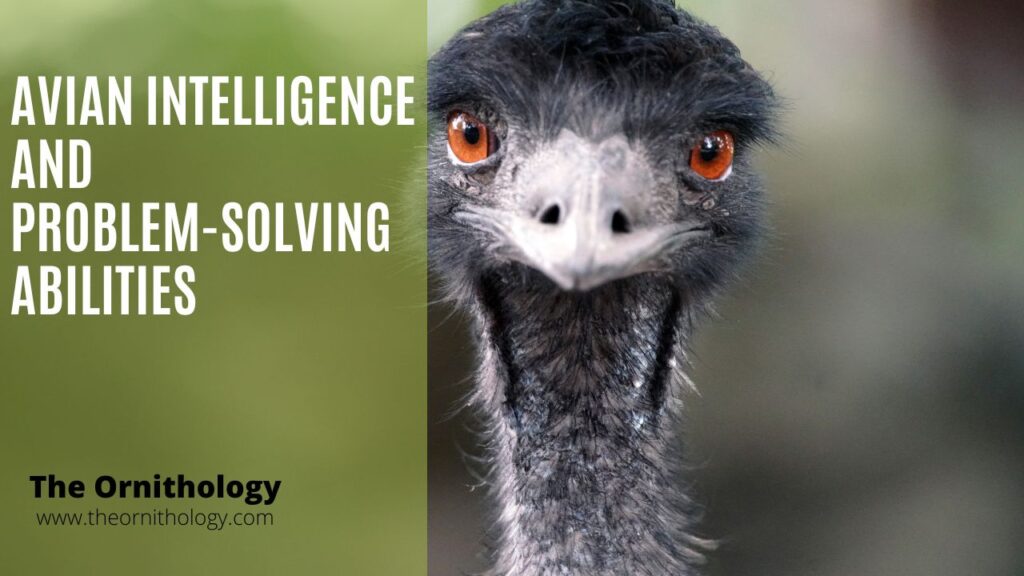Cognitive Abilities of Birds

Birds are often underestimated when it comes to intelligence, but they possess a remarkable range of cognitive abilities that allow them to solve complex problems and adapt to their environments:
- Learning and Memory: Birds can learn from experience, remember spatial information, and recognize individuals, often displaying impressive memory retention.
- Problem-Solving: Many bird species exhibit problem-solving skills, using trial and error or innovative strategies to obtain food, escape predators, or access resources.
- Social Intelligence: Birds engage in social interactions, forming hierarchies, alliances, and cooperative behaviors. Some species recognize and remember social relationships.
Tool Use and Complex Behaviors
Birds’ cognitive abilities are evident in their use of tools and execution of intricate behaviors:
- Tool Use: Some bird species, like New Caledonian crows, are known for using tools to obtain food. They fashion sticks or leaves to extract insects from crevices or create hooks to access hard-to-reach prey.
- Problem-Solving Behaviors: Birds may use tools or engage in behaviors to manipulate their environment. For example, Goffin’s cockatoos can learn to open locks, and some birds drop hard-shelled nuts from heights to crack them open.
Case Studies in Avian Intelligence
Several examples highlight the depth of avian intelligence:
- New Caledonian Crows: These crows are renowned for their tool-making skills. They create specialized tools for different tasks, demonstrating an understanding of cause and effect.
- African Grey Parrots: African greys are known for their advanced vocal mimicry and problem-solving abilities. They can associate words with meanings and use them appropriately.
- Kea Parrots: Kea parrots in New Zealand are curious and innovative, often exploring new environments and solving puzzles to obtain rewards.
- Pigeons: Pigeons have been shown to excel in tasks involving visual recognition, memory, and navigation. They can learn to distinguish between different artworks and even navigate using landmarks.
- Clark’s Nutcrackers: These birds have a remarkable spatial memory that allows them to cache thousands of seeds in different locations and retrieve them months later.
Avian intelligence challenges our understanding of animal cognition and highlights the diverse ways in which birds interact with their environments. The ability to learn, problem-solve, and adapt to changing conditions demonstrates that intelligence is not limited to mammals and can be found across the animal kingdom.
Frequently Asked Questions (FAQ) – Avian Intelligence and Problem-Solving Abilities
Are birds intelligent?
Yes, birds are intelligent and possess a range of cognitive abilities. They can learn from experience, solve problems, use tools, remember spatial information, and engage in social interactions.
Do all bird species show similar levels of intelligence?
No, intelligence varies among bird species. Some species demonstrate more advanced problem-solving abilities and cognitive skills, while others may have more limited cognitive capacities.
Can birds use tools?
Yes, many bird species are capable of using tools. For example, New Caledonian crows are known for their tool-making skills, using sticks and leaves to extract insects from crevices.
How do birds demonstrate problem-solving abilities?
Birds show problem-solving abilities by using trial and error, innovative strategies, and cognitive reasoning to overcome challenges. This can include finding food, accessing resources, or escaping predators.
Are some bird species better at problem-solving than others?
Yes, some bird species have been observed to be particularly adept at problem-solving. For instance, corvids like crows and ravens are known for their advanced problem-solving skills and tool use.
Can birds recognize individuals and remember social relationships?
Yes, many bird species are capable of recognizing individual conspecifics and remembering social relationships. This is often important for maintaining social hierarchies and cooperative behaviors.
Are there any specific examples of highly intelligent birds?
Yes, there are several examples of highly intelligent birds. New Caledonian crows are known for their tool-making skills, African grey parrots for their vocal mimicry and problem-solving, and kea parrots for their curiosity and puzzle-solving abilities.
How do scientists study avian intelligence?
Scientists use various methods such as experimental tasks, observational studies, and controlled experiments to assess avian intelligence. These studies often involve tasks that require problem-solving, memory, and decision-making.
What implications does avian intelligence have for animal behavior research?
Avian intelligence challenges traditional notions of animal cognition, showing that complex cognitive abilities are not limited to mammals. Understanding avian intelligence sheds light on the diversity of cognitive strategies animals use to navigate their environments.
How does avian intelligence relate to conservation efforts?
Recognizing the intelligence of birds underscores the importance of considering cognitive and behavioral needs in conservation strategies. Protecting habitats, understanding foraging behaviors, and minimizing anthropogenic threats are crucial for the well-being of intelligent bird species.
